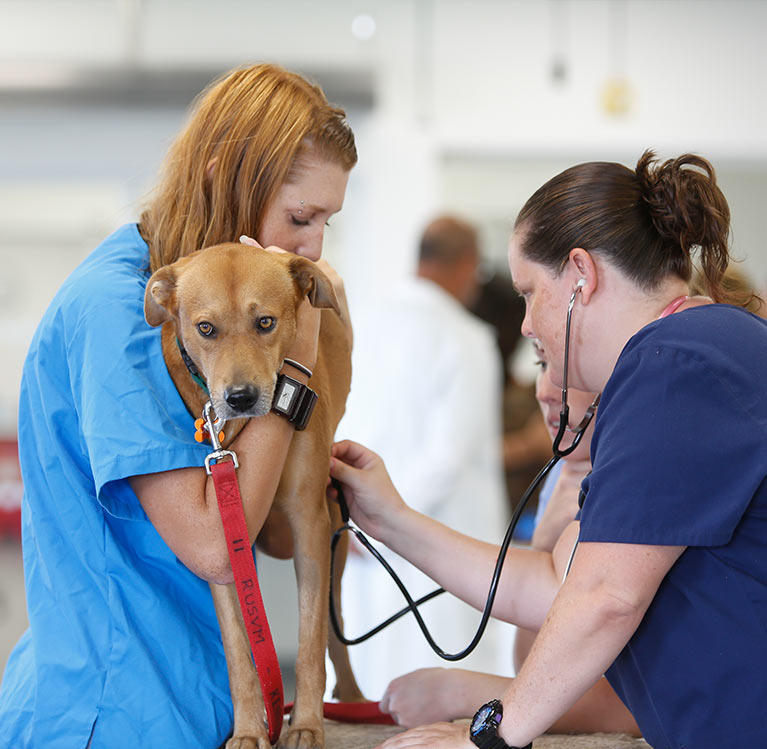Comprehensive Guide to the Solutions Provided by a Veterinary Oncologist
Vet oncology incorporates a vast array of solutions intended at detecting and dealing with cancer in animals. Board Certified Veterinary Oncologist. Oncologists employ advanced analysis strategies and use different treatment options customized per animal's needs. They also focus on helpful care and provide beneficial sources for family pet owners. Understanding these solutions is necessary for making notified decisions. What details elements of veterinary oncology can especially affect a pet's therapy journey?
Understanding Vet Oncology
Veterinary oncology is a customized field focused on detecting and treating cancer cells in animals. This discipline includes a vast array of techniques, from medical therapies such as radiation treatment and immunotherapy to surgical treatments focused on eliminating tumors. Vet oncologists are educated to acknowledge the one-of-a-kind symptoms of cancer cells in various varieties, enabling them to tailor therapy plans to private patients.
Along with typical treatments, vet oncology stresses supportive treatment, which plays an essential function in boosting the lifestyle for damaged animals. This includes discomfort management, nutritional support, and palliative treatment choices. Cooperation with animal proprietors is crucial, as they are essential to decision-making concerning their pet dogs' treatment paths. As research study breakthroughs, vet oncology continues to develop, using brand-new hope and boosted end results for pets diagnosed with cancer. Generally, this area is basic for resolving the intricacies of cancer cells in companion animals.
Advanced Diagnostic Techniques
Advanced diagnostic techniques play an important function in veterinary oncology, offering vital understandings into the existence and degree of cancer in animals. Imaging modalities such as ultrasound, CT scans, and MRI are typically employed to visualize tumors and assess their characteristics. Additionally, biopsy treatments are very important for getting cells samples, enabling definitive medical diagnosis and customized therapy plans.
Imaging Modalities Utilized
Imaging modalities play a necessary role in the diagnosis and monitoring of cancer cells in animals. Veterinary oncologists make use of different sophisticated imaging techniques to assess lump existence, metastasis, and dimension. Radiography, or X-rays, supplies a preliminary sight of bone and breast conditions, while ultrasound gives real-time imaging of soft tissues, permitting for comprehensive examination of internal body organs. Computed tomography (CT) boosts visualization of complex physiological structures and makes it possible for 3D reconstructions, assisting in accurate lump localization. Magnetic resonance imaging (MRI) is invaluable for soft tissue distinction, especially in mind tumors. Furthermore, nuclear medication methods such as positron exhaust tomography (ANIMAL) aid identify metabolic activity within lumps. Collectively, these techniques boost diagnostic accuracy, leading effective treatment approaches for oncological patients.
Biopsy Procedures Clarified
Following the preliminary analysis via imaging modalities, acquiring a clear-cut medical diagnosis frequently needs cells tasting through biopsy procedures. Veterinary oncologists use different biopsy strategies based upon the lump's location and qualities. Fine needle ambition (FNA) is a minimally invasive approach that extracts cells for cytological assessment, perfect for surface masses. Core needle biopsies provide larger tissue samples and are helpful for deeper tumors, permitting histopathological analysis. Surgical biopsies include excising a part or the entire tumor, assisting in detailed analysis. These treatments not only confirm the presence of cancer yet additionally aid establish its kind and grade, directing treatment decisions. Each biopsy approach is picked meticulously to stabilize diagnostic precision with client safety and comfort.
Treatment Choices for Cancer Cells in Family pets
When a pet is identified with cancer cells, a range of therapy options appear to assist take care of the disease and enhance lifestyle. Veterinary oncologists normally recommend a multidisciplinary technique customized to the individual animal's demands, which might include surgical treatment, radiation treatment, immunotherapy, or different therapies.
Surgical treatment is commonly employed to eliminate lumps and damaged tissues, potentially resulting in total remission sometimes. Radiation treatment aims to ruin and target cancer cells, lowering lump dimension and reducing symptoms - Pet Cancer Surgery. Immunotherapy harnesses the pet's immune system to combat cancer better, while alternative treatments could include acupuncture or organic supplements to support total health
Each treatment option carries its very own advantages and threats, and vet oncologists work closely with animal owners to design a comprehensive plan that aligns with the pet dog's details medical diagnosis and the proprietor's wishes. The ultimate objective is to improve the animal's comfort and quality of life throughout their cancer cells journey.
Chemotherapy for Pets
Radiation treatment is an usual therapy choice for pets detected with cancer cells and is typically used in combination with various other therapies laid out by veterinary oncologists. This treatment entails the additional info administration of specific medications developed to ruin and target cancer cells, thus lowering growth size and stopping the spread of the disease. Vet oncologists tailor radiation treatment protocols based upon the type of cancer cells, the pet's total health, and the wanted treatment result.
Adverse effects can happen, as these medicines may additionally affect healthy and balanced cells. Common reactions consist of nausea, throwing up, and short-lived modifications in cravings - Veterinary Oncologist. Veterinary oncologists are outfitted to manage these side impacts properly, ensuring the family pet's convenience throughout the therapy process. Routine tracking with blood examinations and follow-up consultations is important to analyze the animal's action to radiation treatment and make necessary modifications. Eventually, radiation treatment can give significant benefits, enhancing the lifestyle for pets dealing with cancer diagnoses

Radiation Treatment in Vet Medicine
Radiation therapy functions as an efficient treatment choice for family pets detected with local lumps, offering a targeted approach to cancer management. This technique uses high-energy radiation to damage the DNA of cancer cells, preventing their capacity to multiply. It is specifically beneficial for tumors that are not amenable to surgical elimination or for instances where surgery might not be viable as a result of the lump's area.
Veterinary oncologists tailor radiation protocols based on my site lump dimension, area, and kind, along with the family pet's general health and wellness. Treatment can be supplied by means of outside beam radiation or brachytherapy, each with distinctive benefits. Normally, several sessions are required to maximize performance while decreasing negative effects.
Although animals may experience short-lived reactions such as skin irritation, the general objective is to reduce growths and minimize symptoms, eventually improving the pet dog's prognosis and top quality of life. Accordingly, radiation treatment plays an important duty in extensive cancer cells care.
Palliative Care and Top Quality of Life
Palliative care in veterinary oncology concentrates on enhancing the lifestyle for pets dealing with incurable illnesses, making sure convenience and dignity in their final days. This specific strategy prioritizes pain administration, sign control, and emotional support. Vet oncologists analyze each pet's individual requirements, customizing treatments to alleviate discomfort and improve general wellness.
Strategies might consist of carrying out drugs for pain relief, managing nausea, and dealing with other upsetting signs. Furthermore, dietary assistance is commonly given to keep toughness and boost cravings. The psychological element of palliative care is similarly essential; producing a calm environment helps in reducing anxiousness for both pet dog and proprietor.
Eventually, the goal of palliative care is to permit pets to appreciate their continuing to be time with as much pleasure and self-respect as possible. By concentrating on convenience and lifestyle, veterinary oncologists play a vital function in guaranteeing that animals and their families browse this difficult journey with empathy and understanding.
Support for Pet Owners During Therapy

Psychological Assistance for Proprietors
Charting the emotional landscape throughout an animal's cancer cells therapy can be an overwhelming experience for proprietors. The uncertainty bordering diagnosis and prognosis can bring about feelings of anxiousness, sadness, and vulnerability. Vet oncologists acknowledge the relevance of psychological support and commonly give assistance to assist proprietors browse this difficult journey. Communication is necessary; discussing treatment choices and prospective end results can alleviate some fears. Furthermore, using confidence that psychological feedbacks are valid fosters a supportive environment. Numerous oncology centers may likewise suggest support system or counseling services tailored for animal owners, helping with shared experiences. Motivating owners to prioritize self-care during this time is vital, as their psychological health directly influences their family pet's convenience and overall treatment experience.

Resources and Educational Products
Steering with the complexities of a pet's cancer treatment can be intimidating for proprietors, making access to instructional materials and reliable sources vital. Veterinary oncologists usually supply an array of handouts, sales brochures, and online materials that clarify treatment alternatives, prospective negative effects, and care strategies. These resources aid empower and debunk the procedure pet owners to make educated choices. Furthermore, several oncology clinics use access to support teams and forums where proprietors can attach with others facing comparable challenges, promoting a feeling of area. Educational workshops and webinars performed by veterinary experts additionally enhance understanding, guaranteeing that proprietors are well-appointed to navigate their animal's trip via cancer treatment with confidence and expertise.
Regularly Asked Questions
How Can I Prepare My Family Pet for a Vet Oncology Visit?
Preparing an animal for a veterinary oncology see entails celebration clinical records, noting symptoms, and ensuring the animal fits. A calm attitude and acquainted products can assist reduce anxiousness throughout the consultation.
What Are the Indicators My Pet Dog May Have Cancer Cells?
Indicators that a pet dog might have cancer cells consist of unusual weight loss, persistent throwing up or looseness of the bowels, uncommon lumps or swellings, sleepiness, modifications in appetite, difficulty breathing, and modifications in actions. Motivate veterinary attention is vital.
How Can I Assistance My Pet Dog Psychologically During Treatment?
Sustaining a family pet mentally during therapy includes offering convenience, preserving routines, supplying mild affection, and making certain a tranquil environment. Participating in peaceful play and regular friendship helps alleviate stress and anxiety and promotes a complacency.
Are There Different Therapies for Pet Dogs With Cancer?
Different therapies for pet dogs with cancer consist of acupuncture, herbal therapies, and nutritional support. These methods might match standard treatments, advertising overall wellness. Consulting with a vet is vital for reliable and safe combination of different therapies.
What Expenses Should I Expect for Veterinary Oncology Solutions?
The awaited prices for veterinary oncology services can differ substantially, typically affected by diagnostics, therapies, and ongoing care. Family pet proprietors should prepare for costs varying from appointments to specialized therapies, showing the intricacy of cancer cells monitoring.
Cooperation with pet owners is vital, as they are indispensable to decision-making concerning their pets' treatment paths. Each treatment choice brings its very own benefits and dangers, and vet oncologists function carefully with family pet proprietors to make a comprehensive plan that lines up with the animal's certain medical diagnosis and the owner's desires. Animals may experience short-term reactions such as skin irritation, the overall aim is to shrink tumors and alleviate symptoms, inevitably improving the pet dog's prognosis and quality of life. Assistance for animal proprietors during therapy is crucial in guiding with the psychological difficulties connected with a pet dog's cancer diagnosis. Preparing a family pet for a veterinary oncology check out entails celebration medical records, noting signs and symptoms, and guaranteeing the pet dog is comfy.